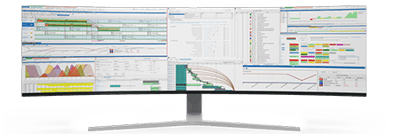Stay FDA Compliant in Medical Device Manufacturing
In medical device manufacturing, adhering to FDA regulations is vital. The consequences of non-compliance can be severe, including product recalls, legal liabilities, and damage to a company's reputation. One critical aspect of FDA compliance is efficient production scheduling.
In this blog, we will explore the importance of scheduling in compliance with FDA regulations and how integrating scheduling software like PlanetTogether with ERP, SCM, and MES systems such as SAP, Oracle, Microsoft, Kinaxis, and Aveva can streamline and enhance the compliance process.

The FDA Regulations
The Food and Drug Administration (FDA) plays a pivotal role in ensuring that medical devices are safe and effective for patient use. Their regulations cover a wide array of aspects in the manufacturing process, including design control, quality management systems, labeling, and post-market surveillance. While all these areas are crucial, adhering to FDA regulations during production is particularly vital.
Here are some key aspects of FDA regulations that impact medical device manufacturing:
Design Control: Companies must have robust processes to design and develop medical devices. Any changes to the design need to be well-documented and controlled.
Document Control: Maintaining accurate and up-to-date documentation throughout the manufacturing process is mandatory. This includes records of device history, materials used, and production procedures.
Quality Management Systems: Companies must establish and maintain a quality management system (QMS) that meets FDA requirements. This involves process validation, risk management, and thorough testing.
Traceability: Medical device manufacturers must be able to trace each product's components and manufacturing history, making it possible to identify and address any issues quickly.
Production Records: Accurate records of each production run must be kept, including batch records, equipment calibration, and personnel training.
Complaint Handling: Companies must have a system in place for handling and reporting complaints and adverse events related to their devices.

The Role of Efficient Scheduling in FDA Compliance
Efficient scheduling is a cornerstone of FDA compliance in medical device manufacturing. It helps ensure that all manufacturing processes adhere to the strict regulations set by the FDA. Here's how:
Batch Control
Scheduling software like PlanetTogether can help in maintaining batch control by creating production schedules that define the quantity and specifications of each batch. This ensures that each batch is manufactured consistently and that deviations are immediately flagged for investigation.
Documentation
Proper documentation is essential in FDA compliance. Integrating scheduling software with your ERP, SCM, and MES systems ensures that all production data is recorded accurately and in real-time. This includes the recording of material usage, machine settings, and personnel involved in each production run.
Quality Assurance
Quality management systems are crucial in the medical device industry. Scheduling software can enforce standardized processes and quality checks, reducing the risk of deviations and non-compliance. It can also trigger quality control points at specific stages of production to ensure that the product meets regulatory standards.
Traceability
Integration between scheduling software and your MES system allows for comprehensive traceability. Each step of the production process, from raw materials to the finished product, can be tracked and documented. In the event of a recall or an audit, this traceability ensures that you can quickly identify the affected products and take appropriate action.
Compliance Reporting
Scheduling software can generate compliance reports automatically, reducing the burden on your compliance team. These reports can provide a comprehensive overview of your manufacturing processes, including deviations, corrective actions, and overall compliance status.
![]()

Integrating PlanetTogether with ERP, SCM, and MES Systems
Now that we understand the critical role of scheduling in FDA compliance, let's explore how integrating scheduling software like PlanetTogether with your existing ERP, SCM, and MES systems can enhance your compliance efforts.
Real-Time Data Sharing
Integration enables real-time data sharing between systems. When a production order is created or updated in your ERP system, it can immediately trigger the scheduling software to adjust the production schedule. This ensures that production plans are always aligned with customer orders and regulatory requirements.
Improved Visibility
Integrating scheduling with your MES system provides visibility into the shop floor, allowing you to monitor and control production processes closely. You can track the progress of each batch, identify bottlenecks, and address deviations promptly.
Data Accuracy
Manual data entry errors can lead to compliance issues. Integration eliminates the need for manual data transfer between systems, reducing the risk of inaccuracies. This ensures that all production data, from batch records to quality reports, is consistently accurate.
Automated Alerts
Integration enables automated alerts and notifications. If a production process deviates from the approved plan or if a quality issue arises, the system can immediately notify the relevant personnel, allowing for quick corrective action.
Streamlined Reporting
Integrating scheduling with your ERP system simplifies reporting. Compliance reports can be generated automatically, saving time and reducing the risk of human error in data compilation.
In the highly regulated world of medical device manufacturing, scheduling plays a pivotal role in ensuring compliance with FDA regulations. Efficient scheduling not only helps maintain batch control, accurate documentation, and quality assurance but also ensures robust traceability and streamlined reporting.
To achieve these goals, integrating scheduling software like PlanetTogether with ERP, SCM, and MES systems such as SAP, Oracle, Microsoft, Kinaxis, and Aveva is crucial. This integration enhances data accuracy, visibility, and automation, making it easier for medical device manufacturers to meet and exceed FDA compliance requirements.
Investing in scheduling integration is not just a regulatory necessity; it is a strategic decision that can enhance efficiency, reduce costs, and ultimately contribute to the delivery of safe and effective medical devices to patients worldwide.
In the ever-evolving landscape of medical device manufacturing, staying compliant has never been more critical, and efficient scheduling is your path to success.
Are you ready to take your manufacturing operations to the next level? Contact us today to learn more about how PlanetTogether can help you achieve your goals and drive success in your industry.
Topics: Data Accuracy, PlanetTogether Software, Integrating PlanetTogether, Real-Time Data Sharing, Improved Visibility, Automated Alerts and Notifications, Streamlined Reporting, Medical Device Manufacturing




















LEAVE A COMMENT